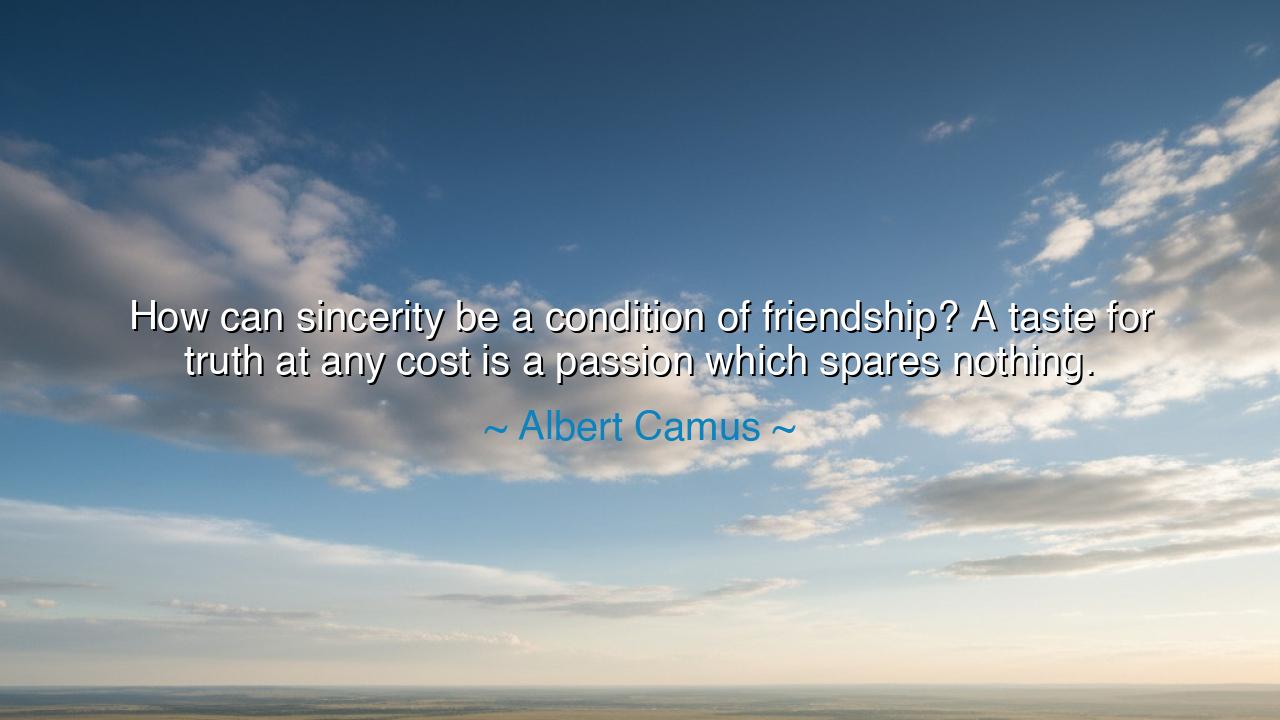
How can sincerity be a condition of friendship? A taste for truth
How can sincerity be a condition of friendship? A taste for truth at any cost is a passion which spares nothing.






Listen, O seeker of wisdom, to the penetrating insight of Albert Camus: “How can sincerity be a condition of friendship? A taste for truth at any cost is a passion which spares nothing.” Here, the voice of the thinker, the prophet of reason and human conscience, challenges the very foundations of what we call friendship. He asks us to consider whether mere sincerity, the surface display of honesty, suffices to forge bonds that endure. For Camus, the pursuit of truth is not gentle or convenient; it is a flame that consumes, a passion that bends to no comfort or social ease. To walk the path of truth is to court discomfort, confrontation, and sometimes the loss of those we hold dear.
The origin of this reflection lies in the crucible of Camus’ life and thought, shaped by the turbulence of 20th-century France, the existential questioning of the human condition, and the moral crises wrought by war and injustice. Camus, a man of fierce intellect and delicate conscience, observed that human connections are often tested by the uncompromising nature of truth. While sincerity might smooth over differences and create the illusion of harmony, a true commitment to honesty—truth spoken regardless of consequence—leaves nothing untouched. It is a standard that demands courage and integrity above all.
Consider the depth of this assertion: a “taste for truth at any cost” is not a gentle virtue. It is a passion that spares no lie, no pretense, and no weakness of the spirit. It can wound, alienate, or even sever bonds, for not all hearts are prepared to face unvarnished reality. Yet, in this very intensity lies the nobility of authentic friendship. Camus implies that the truest connections are those that can survive the flame of complete honesty, for it is only in the full illumination of reality that trust and respect can take root. To cultivate such bonds is to accept risk, vulnerability, and the possibility of loss.
History whispers its own testimony. Recall the friendship of Socrates and Alcibiades, chronicled in the annals of Athens. Socrates, relentless in his pursuit of moral and philosophical truth, spoke unflinchingly, even when his words troubled his beloved Alcibiades. Their friendship was not defined merely by sincerity, but by a shared engagement with the highest questions, even when such engagement caused tension and discomfort. It is a timeless reminder that truth, though demanding and unforgiving, can forge a deeper, more resilient bond than the comfort of polite pretense ever could.
Yet Camus also warns us of the peril within this pursuit. A friendship founded solely on truth-telling without empathy may become harsh, unbearable, and solitary. The passion for truth spares nothing, and in its wake, it may leave hearts bruised. The challenge, then, is to balance courage with compassion, to deliver honesty not as a weapon, but as a gift—a mirror in which our companions may see themselves with clarity, not judgment. Here lies the profound moral labor of friendship: to wield truth with care, yet without compromise.
Let us consider a modern echo of this principle. Think of whistleblowers in contemporary society, those who reveal corruption or injustice despite personal peril. Edward Snowden, for instance, acted upon a relentless commitment to truth, prioritizing integrity over comfort or popular opinion. Friendships, alliances, and social bonds were tested and often strained by this act of revelation. Camus’ words resound here: the pursuit of truth at any cost does not bend to convenience, and yet it carries within it the possibility of profound moral victory.
From these reflections arises a clear lesson: friendship is not a fragile courtesy, but a demanding practice of integrity. True friends are those who can endure the light of honesty, who are willing to confront reality together, and who honor truth above the fleeting comforts of pretense. Practical actions follow: speak with courage, listen with openness, cultivate friends who value integrity as much as companionship, and embrace the difficult conversations that nurture growth rather than avoidance.
Thus, as the ancients might have spoken, let us heed Camus’ teaching: a taste for truth, though exacting, is the foundation upon which the noblest friendships are built. Do not cling merely to sincerity as a shield, but welcome the fiery clarity of honesty, for in it, the soul finds companions who reflect, challenge, and elevate one another. In this crucible, friendship is forged not from ease, but from the unflinching embrace of life in its most honest and illuminating form.






AAdministratorAdministrator
Welcome, honored guests. Please leave a comment, we will respond soon